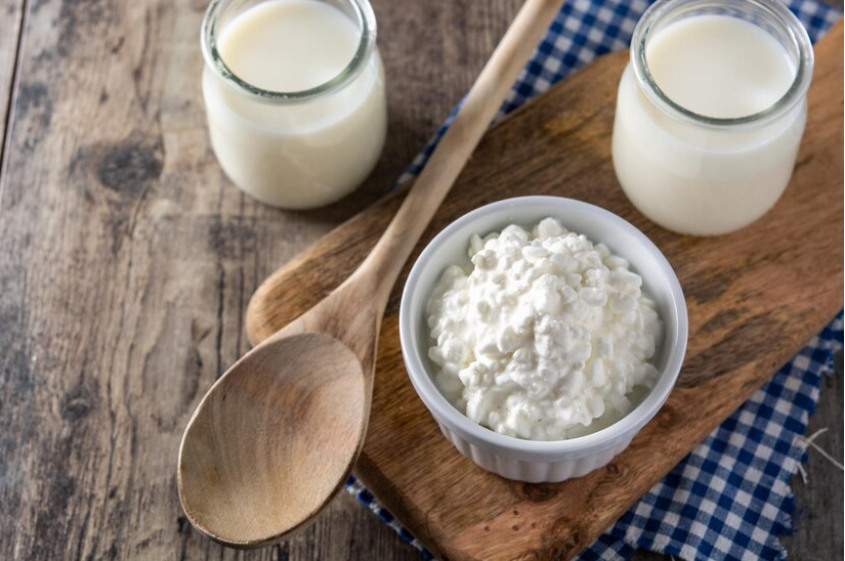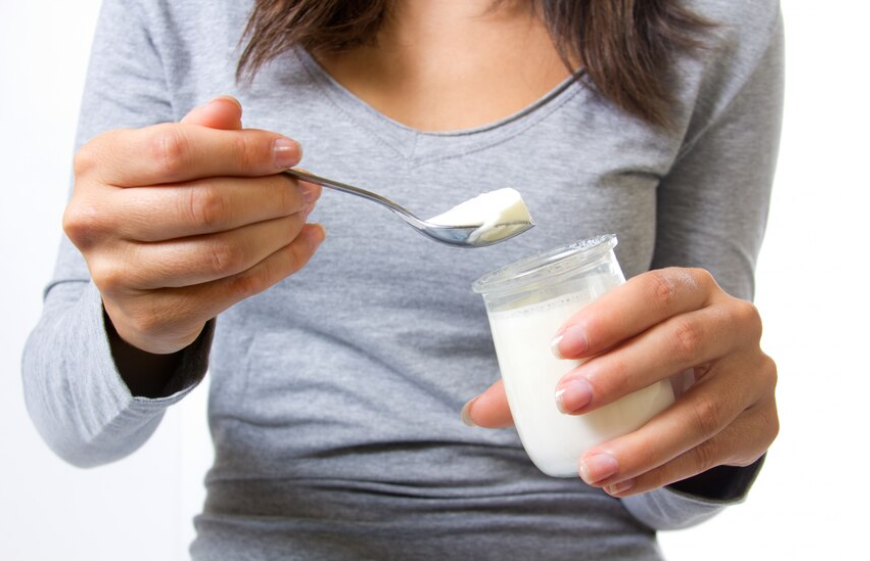

Many recent studies have shown a link between the intestinal microbiota and the bacteria that reside there in relation to age, and can even be used to treat aging. Let's learn more about how probiotics treat aging in the following article.
Probiotics or probiotics are products that contain beneficial microorganisms for the intestines. Accordingly, if we tolerate it, it will help the body increase beneficial bacteria, while helping to inhibit harmful bacteria, and balance the intestinal microflora, thereby helping to improve health, especially for children subjects. Additional sources of probiotics can include fermented pickles, cheese, sauerkraut, kimchi, yogurt or supplementation through functional foods containing probiotics.
Probiotics are not the same as digestive enzymes, this is a type of compound that is prepared and has the same effects as digestive enzymes, helping the body break down carbohydrates, fats and proteins from foods to Helps the body absorb nutrients more easily into the blood, helping to nourish the body.

Probiotics help maintain the intestinal microflora in a healthy state.
Age-related degeneration will give rise to a number of diseases related to the imbalance of the microbiome and immune system related to intestinal problems. Therefore, the intestine is considered a key target organ to help improve the quality of life in old age. The gut microbiota may have powerful effects on aging-related decline through its nutritional and immunomodulatory activities. Reduced abundance of beneficial species and low microbial biodiversity in the elderly have been implicated in the pathogenesis of many diseases. Maintaining a healthy lifestyle along with an age-appropriate diet that includes probiotics can contribute to the reduction of chronic pro-inflammatory conditions and other age-related conditions. .
The beneficial effects of lactic acid bacteria and bifidobacteria may alleviate some of these disorders based on their immunomodulatory properties, as well as their ability to produce bioactive metabolites from phytoestrogens in the preparation. Diet. On the one hand, maintaining the integrity of the intestinal barrier and increasing resistance to infection are the main reported immune benefits of probiotics. On the other hand, the consumption of a phytoestrogen-rich diet in the presence of selected probiotic bacteria can lead to the production of equol, enterolignans and urolithin which are considered protective and resistant to chronic diseases. related to aging problems. Accordingly, maintaining the integrity of the intestinal barrier and increasing the ability to fight infections are the main immune benefits of probiotics.
Probiotics will likely be applied to help correct age-related gut microbiome imbalances and introduce strains with health-promoting effects. Probiotics' anti-aging treatment has also been confirmed in the elderly. Probiotics can help prevent diarrhea, protect against pathogens, strengthen intestinal barrier function, and improve intestinal function. gastrointestinal tract and inflammatory bowel disorders, helps regulate immunity and prevents colon cancer.
Probiotic intervention, with or without specific dietary components, will help improve microbiota functions to achieve health benefits in old age. In this context, a diet rich in phytoestrogens may be considered an anti-aging treatment due to their antioxidant and estrogenic effects. Here is a summary of probiotics' promising anti-aging treatment to help alleviate a number of age-related conditions based on their immunomodulatory properties, as well as their ability to induce biologically active metabolites from dietary compounds, such as phytoestrogens.

Probiotics improve aging problems.
There is increasing evidence that the aging process is also closely linked to probiotic homeostasis. More than a century ago, Elie Metchnikoff proposed that the onset of aging could be delayed by manipulating the intestinal environment with friendly bacteria. He is considered among the pioneers in the rapidly growing field focused on the health benefits of probiotics. Probiotics have been recognized as very safe and have significant health benefits for the elderly, such as helping to: enhance immunity and help maintain a healthy intestinal microbiota. strong.
Today, probiotics are not only a very important topic in the field of scientific research on geriatrics, but also the source of a global multi-billion dollar industry. Advances in gerontology have led us to wonder whether certain probiotics might target the underlying biological mechanisms of aging. If such mechanisms can be validated, probiotics could be used to delay the onset of many age-related chronic diseases, thereby helping to prolong effectively prolong the lifespan. Some clinical trials of certain probiotic strains have even been completed with promising results regarding their anti-aging effects.
Research and interventions on probiotics in the elderly population are still very scarce, and this is mainly due to the challenges of placebo control as the elderly are considered a vulnerable population. damage with accompanying diseases. In addition, observing the longitudinal effects of probiotics over long periods of time is less feasible. Therefore, most research on aging in human clinical trials involves observing beneficial effects related to inflammation, immunomodulation, infection, and metabolism. metabolic profile, cognitive function, gut microbiota and quality of life.
For example, consumption of a probiotic drink containing Lactobacillus casei in elderly people taking Shirota for 4 weeks has been reported to improve the tumor-killing activity of natural killer (NK) cells. ), increased serum interleukin (IL)-10 concentrations and decreased the number of days in which fever was detected. Daily consumption of Bifidobacterium lactis HN019 for 3 or 6 weeks enhanced the phagocytic capacity of NK cells and polymorphonuclear cells (PMN). Consumption of L. plantarum C29 fermented soybeans for 12 weeks by elderly subjects with mild cognitive impairment showed improvements in cognitive function and increased serum BDNF levels.
A number of probiotics have shown convincing evidence of the anti-aging effects of probiotics in a variety of animal and human studies. Here we will take L. plantarum C29, L. paracasei PS23 and B. breve B-3 as examples to illustrate the models used to study the anti-aging effects of probiotics.
L. plantarum C29 has been reported as a probiotic to improve memory impairment in various rodent models, such as in a scopolamine-induced memory impairment mouse model, a mouse model D-galactose-induced senescence, Fischer 344 rat model and TNBS-induced colitis rat model. Increased expression of BDNF, DCX and CREB in the hippocampus, decreased inflammatory markers, p-p65, p-FOXO3a, COX-2 and iNOS, and decreased aging markers, p16 and p53, were observed. close to L. plantarum C29. Treatment with C29 inhibits aging-related activation of Akt, mTOR, and FOX3a in the colon and hippocampus more potently than treatment with rapamycin, an mTOR inhibitor. Recently, a multicenter, randomized, double-blind, placebo-controlled clinical trial was conducted to study 100 elderly subjects with a mean age of 69 years. After When consuming 12 weeks of L. plantarum C29 fermented soybeans, improvements in combined cognitive function related to memory and attention, especially in the area of attention, were observed. observed with increased serum BDNF levels.
L. paracasei PS23 in the treatment of aging has also been shown to be a probiotic that helps alleviate aging and age-related loss of muscle mass and strength, cognitive decline and memory loss. in the SAMP8 aged mouse model. In addition, it has also been observed that PS23 attenuated sarcoid progression in geriatric treatment, which may be caused by maintaining mitochondrial function through reducing inflammation and ROS are related to aging, by helping maintain protein absorption. PS23 administration increased the number of mitochondria and the expression of PGC1α, SIRT1, NRF1, and TFAM involved in mitochondrial biogenesis. Furthermore, increased levels of superoxide dismutase, glutathione peroxidase and tumor necrosis factor (TNF)-α activities and lower serum IL-10 levels suggest that L. paracaseiPS23 enhances the ability Antioxidant and helps regulate inflammation.
Based on results from maternal separation and a rat model of depression induced by chronic corticosterone treatment, L. paracasei PS23 is also a potential psychotropic organism. Administration of live or heat-killed L. paracasei PS23 improved anxiety- and depression-like behaviors and increased dopamine and 5-HT levels in the hippocampus, prefrontal cortex, and associated with higher serum anti-inflammatory IL-10 levels and lower corticosterone levels. The anti-aging effect of heat-killed L. paracasei PS23 was not evaluated in SAMP8 mice, however in the D-galactose-induced aging model, heat-killed L. paracasei PS23 showed significant improvements in muscle strength and other aging treatment biomarkers as effective as those with L. paracasei PS23 live cells.
Age-related changes in nutritional behavior and microbial diversity during aging lead to increased susceptibility to infection and disease. Likewise, the presence of certain beneficial microorganisms in the gut may help prevent or delay certain age-related diseases by improving the immune response or by producing metabolites. biologically active chemicals such as equol, entero, lignans and urolithin. The evidence for probiotic supplementation along with an age-specific diet to improve health during aging is promising. However, further studies on manipulation of the gut microbiota are needed to better define the role of probiotics and evaluate the true potential of these interventions.
Aging is one of the issues that many people are most concerned about today. It is an inevitable process of living organisms and a natural process that occurs continuously. This phenomenon will also gradually increase over time. time. Our bodies peak in terms of physical health and organ function at age 35, then gradually decline.
To prevent aging, in addition to building a healthy diet supplemented with probiotics, you can supplement functional foods containing Nicotinamide Mononucleotide , which is a precursor enzyme of Coenzyme NAD. Nicotinamide Mononucleotide is a miracle drug that helps rejuvenate aging and is one of the main sources of cellular energy in the body. NMN has anti-aging effects at the cellular level, reducing aging of the skin, muscles, bones, liver, vision, improving insulin sensitivity, immune function and physical activity levels. NAD is a coenzyme that plays an important role in metabolism and blood circulation, has the function of helping the body avoid disease, and directly affects aging, thus has anti-aging and anti-aging effects. premature skin aging and reverse aging.